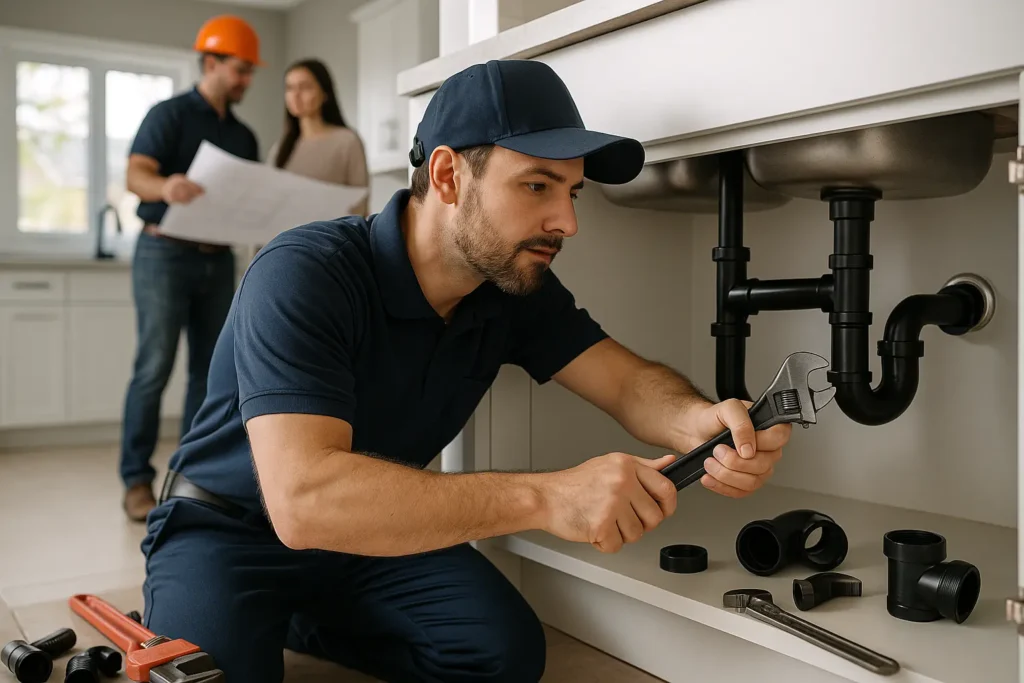
Whether you are about to renovate your house or take care of a new construction project, knowing when to call a plumbing contractor or a plumber is very important. In appearance, the roles of plumber and plumbing contractor are identical, but the practicalities are quite dissimilar. However, awareness of the difference guarantees you get the correct person, save on costs and get reliable quality results.
Who is a Plumber?
A plumber is a person who focuses on water, sewage and gas lines. He perform large-scale work and day-to-day maintenance. However, many plumbers have undergone licensed apprenticeships or vocational training, which permits them to perform plumbing work in residential or commercial settings and occasionally on an industrial scale as well.
Key Responsibilities of a Plumber
- Handling and fixing leaks in plumbing fixtures and pipes
- Installation and replacement of faucets, sinks, toilets and water heaters.
- Clearing clogged drains and sewers
- Conducting routine maintenance and inspections
- Maintenance of pipes and fittings from minor repairs and adjustments.
Most plumbing contractors manage day to day plumbing problems and carry out small installations. Plumbers normally do their work solo or within an establishment that provides plumbing services. Their work focuses on doing direct repairs and direct installations rather than controlling extensive constructions.
Who Is a Plumbing Contractor?
The plumbing contractors do a lot of the management and oversight work. They take more advanced duties, extensive experience and proper license for undertaking bigger projects. When it comes to plumbing contracts, people involved in them are typically chosen for the works requiring permits to be acquired, strict blueprints as well as compliance with local building regulations.
Primary Obligations of a Plumbing Contractor
Some of the major duties of a plumbing contractor are the design and installation of plumbing systems in new constructions, large renovations and creation of complex plumbing arrangements for commercial.
- Planning and designing the plumbing systems in entirely new constructions or large scale renovating process.
- Planning and controlling the installation of complex plumbing systems in commercial buildings.
- Water, gas and sewer systems installation in constructions
- Getting the right permits and the statutory requirements.
- Managing the job of plumbers and outside contractors
- Project planning of tasks and expenses
- Contractors that specialize in plumbing regularly work with architects, contractors in general and inspectors on the job.
Their function is the management of massive plumbing projects, the organization of workers and resources for secure work.
Education and Licensing Differences
Well, there are licensing requirements for plumbers as well as for plumbing contractors and these differ to a point in scope and types. Most plumbers go through the program of apprenticeship training, hands on experience and then show competence by taking the journeyman plumber test. At some point, they could become a master plumber. Normally, plumbing contractors obtain additional credentials that allow them to have their own business. Moreover, they may even get insurance and bonding to protect themselves & their clients from accidental incidents in connection with the project.
Tools and Equipment Used
While contractors and plumbers both utilize tools such as wrenches, pipe cutters and plungers, both types of contractors usually work with greater systems and equipment than their colleagues. Other such devices may also vary from pipe inspection cameras and blueprints to building management software. In general, plumbers carry tools for quick and immediate repairs, but plumbing contractors also have project management tools in their toolkit for large installations.
Learning the Difference between a Plumber and a Plumbing Contractor
Selecting the right professional to assist with your plumbing needs can help save your budget, and make things move easier.
Here’s a quick breakdown:
Hire a Plumber When:
- There is a leak or a pipe or a faucet has broken
- Your toilet or drain gets blocked
- What you need is to install a new fixture on an already constructed bathroom or kitchen.
- Routine maintenance is required
Hire a Plumbing Contractor When:
- You are building a new residential or commercial building
- You are embarking on a complete remodel of a kitchen, or a bathroom, from the ground up.
- You require new sewer or gas line installation
- The enterprise requires building inspections and official permits on the development
For the job, you will need several plumbers or subcontractors. While plumbers and plumbing contractors are both knowledgeable in basic plumbing, their areas of employment and in general scope of responsibilities are quite different. Regular repairs and maintenance should be done by plumbers, but project-based work should be undertaken by plumbing contractors who are specialized in detailed planning and regulation compliance.
Understanding the difference between plumbers and plumbing contractors enables you to get on top of your plumbing needs quickly, effectively and inexpensively. Whether you’re dealing with a simple leak or starting fresh construction, the choice of professionals is critical to a successful outcome.







